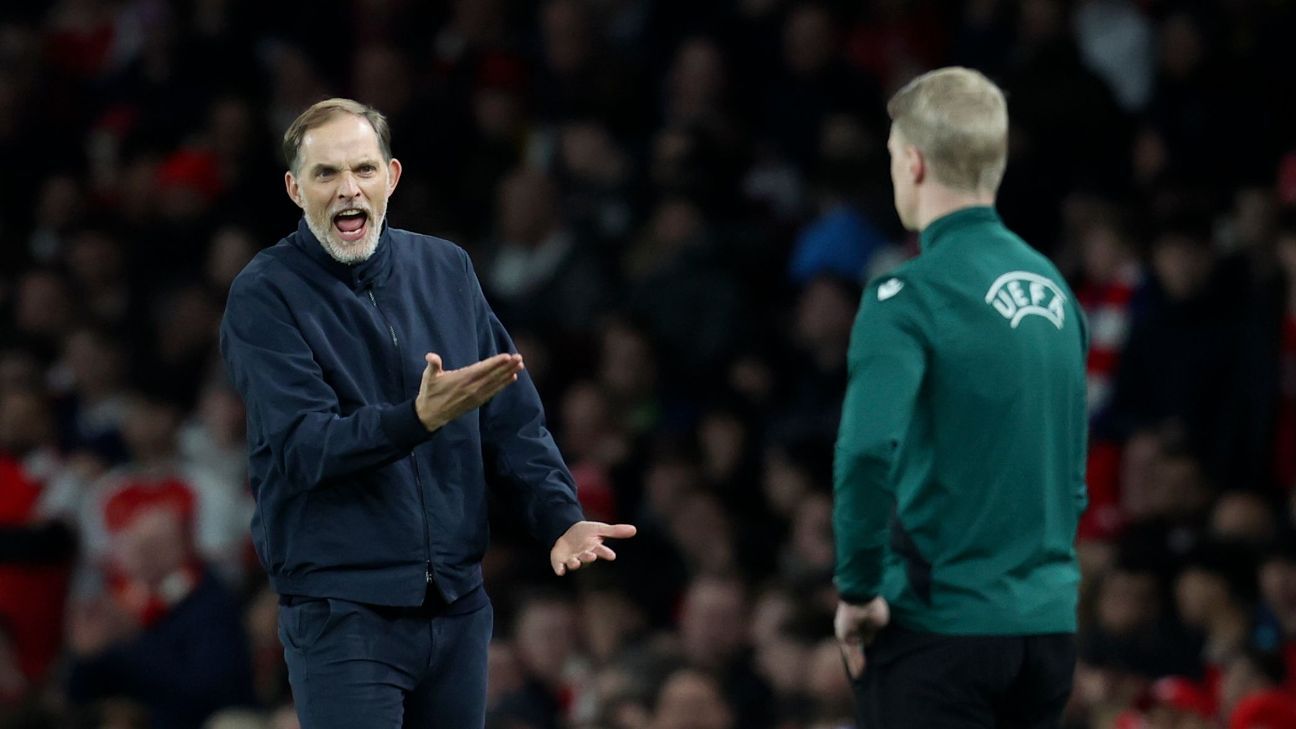Products You May Like
You may have seen this already. It’s the 67th minute of the Champions League quarterfinal first leg at the Emirates between Arsenal and Bayern Munich. The visitors are 2-1 up and Arsenal keeper David Raya is about to restart play with a short, square goal kick. Referee Glenn Nyberg blows his whistle. He hits it a few yards to Gabriel who, not realising play has restarted (and maybe thinking the goal kick should be taken from his corner of the six-yard box), picks up the ball, puts it back down and passes it back to Raya.
Bayern boss Thomas Tuchel was furious after the game, claiming it was a clear penalty and that Nyberg simply didn’t have the courage to give it. “He made a huge mistake not giving the handball penalty,” Tuchel said. “What makes us really angry is the explanation on the field. He told our player that it is a ‘kid’s mistake’ and he will not give a penalty like this in a quarterfinal.”
He added: “This is a horrible, horrible explanation! He is judging handballs! Kid’s mistake, adult’s mistake … whatever! We feel angry!”
– Stream on ESPN+: LaLiga, Bundesliga & more (U.S.)
It was very much a What Tuchel Feels sort of moment (ahem), and while understandable, let me categorically say that Tuchel’s reaction — while perhaps understandable — is 100% wrong, at least in my view. Nyberg was correct and sensible here; Tuchel, meanwhile, comes across as the sort of person who would want you arrested for jaywalking at 6 a.m. on Christmas morning.
At the heart of this is a basic, philosophical argument that applies not just to referees and match officiating, but heck — to legal systems and the law as a whole. Do you apply the strict letter of the law, or do you enforce the spirit of the law? Do you think being a fair arbiter means objectively sticking to the regulations and applying them without fear or favor, whatever the consequence? Or do you like to judge incidents in context, asking yourself the following questions: Did anybody get hurt by this or risk getting hurt? Did anyone gain an advantage and, if so, how much of an advantage?
Your opinion may likely hinge on whether you’re a “spirit” or “letter” type of person (in addition, it probably hinges on whether you’re an Arsenal or a Bayern fan, of course). In this case, it’s pretty evident.
Unlike a head-height tackle — or, say, driving under the influence of drugs or alcohol — this wasn’t dangerous or potentially dangerous. Unlike scoring from an offside position or feigning injury to get an opponent booked — or, say, cheating on your taxes — this did not give Arsenal an unfair advantage or any advantage at all. What’s more, the only punishment Nyberg could have given for the infraction — a penalty kick to Bayern — is wholly and completely disproportionate to the effect it had on the game, which was zero.
It might have been a different story if, as a result of the Gabriel “handball,” Nyberg had shown a yellow card or given one of those goofy indirect free kicks in the area that we hardly ever see and are nearly impossible to score from anyway. But the rules didn’t allow him to do that, so he took a mulligan and moved on.
Tuchel was infuriated by his version of Nyberg’s explanation, which boiled down to the fact that you can’t decide a Champions League quarterfinal game on a penalty given for something this trivial and become his “lack of courage.” Here, Tuchel is wrong. It wouldn’t have been “courageous” to give the penalty; it would have been silly, persnickety and against the spirit of the Laws of the Game. In fact, it would have been downright disrespectful to the sport and the spirit of competition. Who would want to advance to the next round based something as random and stupid as this? Would you not rather earn your place in the semifinal?
Rules — and the associated punishments — are necessary to bring order, to deter cheating, to ensure safety and to foster competition. I get that. But rules without common sense are in vain, especially when the punishment far outstrips the crime.
